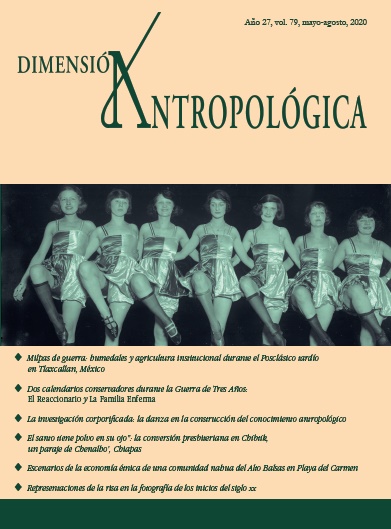Español Español
Keywords:
EspañolAbstract
This essay describes and analyses the religious conversion of the lineage Pasinsa in the township of Chenalho’ in the Highlands of Chiapas, from the traditional Maya-religion to the Presbyterianism in the late 50s and the 60s of the XX Century. Different external and internal factors which formed breeding ground to the collective conversion are mentioned: the marginal position of the lineage and its desire to attain a leadership, the proselytism activities of the north american missionaries, indigenous policies of the Mexican government, among others. The individual conversion of one of the leaders of the new religious movement is analyzed in terms of such concepts as “seeing-as” change of aspect” of Ludwig Wittgenstein, “cultural innovators” and their “strategies” of Frederik Barth and “role-distance of Erving Goffman. This essay examines as well the results of the conversion, both for the neophytes and the next generation: the establishment of the new community in 1965- Chibtik, the agrarian expansion of the allied lineages, their migration to the cities, the adaptation to the more modern form of life.
Downloads
References
Aguirre Beltrán, Gonzalo, El proceso de aculturación en México, México, UIA, 1970.
Barth, Fredrik (comp.), “Introducción”, en Los grupos étnicos y sus fronteras. La organización social de las diferencias culturales, México, FCE, 1976.
Berger, Peter L., Invitation to Sociology. A Humanistic Perspective, Nueva York, Anchor Books, 1963.
Bonner, Arthur, We Will Not Be Stopped. Evangelical Persecution, Catholicism and Zapatismo in Chiapas, Nueva York, Universal Publishers / upublish.com, 1999.
Díaz Cruz, Manuel José, “Formación e identidad de las comunidades indígenas chiapanecas: antecedentes coloniales”, en Carmen Varela Torrecilla, Juan Luis Bonor, Yolanda Fernández Marquínez (eds.), Religión y sociedad en el área Maya, Sociedad Española de Estudios Mayas / Instituto de Cooperación Iberoamericana, 1995, pp. 265-276.
Eber, Christine, Mujeres y alcohol en un municipio maya de los Altos de Chiapas: agua de esperanza, agua de pesar, Miami, Cirma, 2008, pp. 43-45.
Emerson, Ralph Waldo, “History”, en The Complete Essays and other Writings of Ralph Waldo Emerson, Nueva York, The Modern Library, 2004.
Esponda, Hugo, El presbiterianismo en Chiapas: orígenes y desarrollo, México, El Faro, 1986.
Garza Caligaris, María Ana, “Conflicto, etnicidad y género en la política interna de San Pedro Chenalhó, Chiapas”, en Sociológica. Revista del Departamento de Sociología, núm. 63, enero-abril de 2007, pp. 85-110.
Goffman, Erving, Encounters: Two Studies in the Sociology of Interaction, Harmondsworth, Penguin University Books, 1972.
____________, La presentación de la persona en la vida cotidiana, Buenos Aires, Amorrortu Editores, 2007.
Guiteras Holmes, Calixta, Perils of the Soul. The World View of a Tzotzil Indian, Glencoe, Free Press of Glencoe, 1961.
Haviland, John Beard, Sk’op sotz’leb. El tzotzil de San Lorenzo Zinacantán, México, UNAM, 1981.
Hill, Robert M., y John Monaghan, Continuities in Highland Maya Social Organization: Ethnohistory in Sacapulas, Guatemala, Filadelfia, University of Philadelphia Press, 1987.
Hill, Robert M. I., Los kaqchikeles de la época colonial: adaptaciones de los mayas del Altiplano al gobierno español, 1600-1700, Guatemala, PlumSock, 2001.
INEGI, Página oficial, 2010, recuperado de: [http://www.inegi.org.mx/est/contenidos/proyectos/accesomicrodatos/cpv2010/default.aspx].
Jacorzynski, Witold, En la cueva de la locura. Aportaciones de Ludwig Wittgenstein a la antropología social, México, CIESAS (Publicaciones de la Casa Chata), 2008.
____________, La maldición de Judas Iscariote. Aportación de Ludwig Wittgenstein a la teología, la filosofía y antropología de la religión, México, CIESAS (Publicaciones de la Casa Chata), 2011.
Mulhall, Stephen, On Being in the World: Wittgenstein and Heidegger on Seeing Aspects, Londres, Routledge, 1993.
Pérez Arias, Juan, “Breve historia de la fundación de la iglesia evangélica presbiteriano, en el paraje Chimtic, Chenalho’, Chiapas” (inédito), 2017.
Pérez Pérez, Elías, “La historia de vida: una familia tzotzil de Chiapas, México”, Universidad de Salamanca, Salamanca (inédito), 2003.
____________, “Dos mundos rurales en transformación: España-México”, tesis para obtener el grado de doctor en antropología, Universidad de Salamanca, Salamanca (inédito), 2009.
Pitarch, Pedro, “Infidelidades indígenas”, en La cara oculta del pliegue. Ensayos de antropología indígena, México, Artes de México / Conaculta, 2013.
Rivera Farfán, Carolina, “Dinámica del crecimiento evangélico en Chiapas. El caso del valle de Pujiltic”, tesis para obtener el grado de doctora en antropología, IIA-FFYL-UNAM, México, 2003.
____________, María del Carmen García Aguilar, Miguel Lisbona Guillén, Irene Sánchez Franco, y Salvador Meza Díaz, Diversidad religiosa y conflicto en Chiapas. Intereses, utopías y realidades, México, UNAM / CIESAS / Cocytech-Secretaría del Gobierno del Estado de Chiapas / Segob, 2005.
Robledo Hernández, Gabriela Patricia, Identidades femeninas en transformación. Religión y género entre la población indígena urbana en el altiplano chiapaneco, México, CIESAS (Publicaciones de la Casa Chata), 2010.
____________, y Jorge Luis Cruz Burguete, “Religión y dinámica familiar en los Altos de Chiapas. La construcción de nuevas identidades de género”, en Estudios Sociológicos, vol. 23, núm. 68, 2005, pp. 515-534.
Rus, Jan, “La comunidad revolucionaria institucional”, en Juan Pedro Viqueira y Mario Ruz (coords.), Chiapas. Los rumbos de otra historia, México, UNAM / CIESAS / CEMCA, 1995.
____________, y Robert Wasserstrom, “Civil-Religious Hierarchies in Central Chiapas: A Critical Perspective”, American Ethnologist, vol. 7, núm. 3, 1980, pp. 466-478.
Viqueira Juan Pedro, Encrucijadas chiapanecas. Economía, religión e identidades, México, Tusquets Editores, 2002.
Wittgenstein, Ludwig, Investigaciones filosóficas, Barcelona, Crítica, 1988.
____________, “Conferencia sobre ética”, en Conferencia sobre ética con dos comentarios sobre la teoría del valor, Barcelona, Paidós / Universidad Autónoma de Barcelona, 1990, pp. 33-44.



